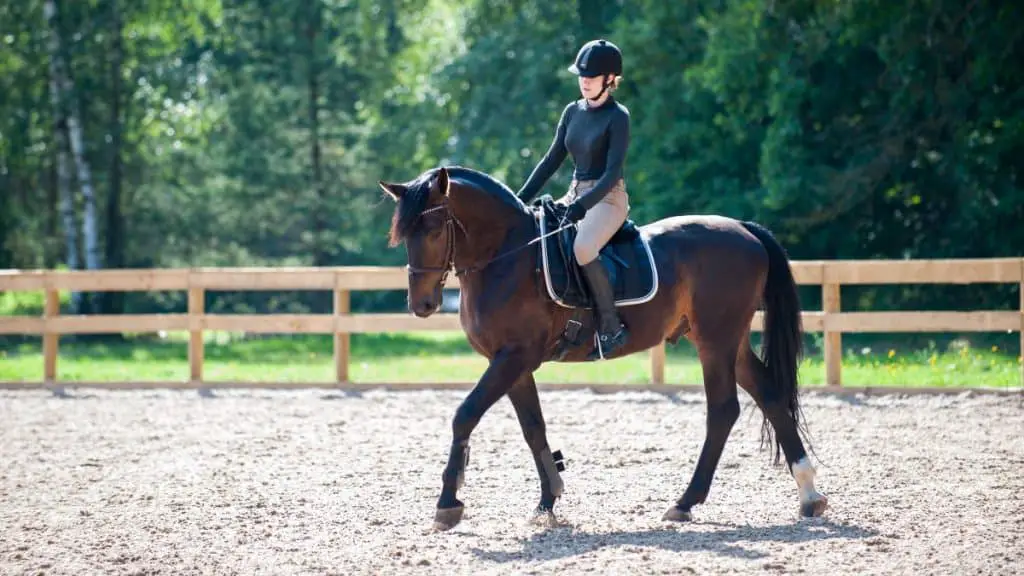Skip To Section
During the first six to eight months of pregnancy, light exercise (including riding) can be beneficial for a broodmare. You should not ride a broodmare after six months since the foal does most of its growth during the third trimester and causes the mare’s body shape to change and balance to shift.
The average broodmare is pregnant for eleven to twelve months, but can a broodmare be ridden during that time? And if so, how safe is it for the mare and foal? The answer depends on how far into the pregnancy the broodmare is, the type of exercise, and the weather conditions.

Can I Ride A Broodmare?
Yes. You can ride a broodmare, but there are some provisions.
- Avoid riding a pregnant mare for the first 30 days of the pregnancy.
- Avoid riding a pregnant mare after the sixth month of gestation.
- Avoid riding a pregnant mare in extreme temperatures that could risk the health of the mare or the foal.
How Long After A Mare Gives Birth Can She Be Ridden?
Always make assessments on an individual basis, but never ride a broodmare for a minimum of six to eight weeks after foaling.
It may take longer for a mare that has a difficult birth to return to work.
A difficult birth may include:
- Bleeding
- Rupture of internal organs
- Breach of the vagina
- Breach of the rectum
Unless directed by your veterinarian, do not strictly stall a broodmare post-delivery. Allow your mare to walk in the open to help to prevent fluid buildup that is frequent in post-pregnancy stalled mares.
Closely monitor your mare’s movements after foaling. Although walking prevents fluid buildup, excessive motion can contribute to colic while the abdomen is still distended.
Can You Compete On A Pregnant Mare?
You can compete on a healthy pregnant mare during the first six months of her pregnancy without risking the health of the mare or her foal. (Healthy is the keyword!)
Some veterinarians recommend keeping pregnant mares on light work during the thirty to forty-five days of the pregnancy as a precaution. Light work reduces the chance of complications that may put the foal in danger during the most critical weeks of the pregnancy.
Do not compete on a pregnant mare that is at risk for complications! (e.g. mares that have previously lost a pregnancy or that have a history of stillborn foals.)
How Do You Get A Broodmare Back To Work?
Do not consider returning a broodmare to work until a minimum of six to eight weeks after foaling. Ideally, wait until a foal has weaned at four or five months old before returning the mare to work.
Separating a mare and her foal while she is still nursing causes undue stress and distraction for the mother. If a broodmare must return to work before her foal has weaned, allow the foal to accompany her if the situation allows.
If a broodmare must return to work before her foal has weaned, but it is not safe to bring them to work, try leaving them with a horse they are familiar with. Be sure that you can trust the “babysitter” horse with the foal before leaving!
If a broodmare is physically fit and her foal has weaned, introduce her back to work over a period of time. Start with short and easy tasks and give your mare time to rebuild her stamina and get back into her routine.
If your broodmare experienced pregnancy or delivery complications, consult your veterinarian for clearance before returning them to work. Failing to get clearance can cause worsening health problems, the end of a career, or even death for your mare.
Post-Foaling Tips For Your Broodmare
After foaling, your broodmare has unique needs that may continue even after she returns to work.
Here are a few things to keep in mind.
- A nursing broodmare may require up to 10 gallons more water per day than other horses.
- A nursing broodmare requires an increase in caloric intake equal to 3% of her total body weight compared to other horses that need 1.5% to 2%.
- Do not stall a mare after foaling (unless instructed to do so); walking helps prevent fluid buildup and promotes healing.
- Mares are at higher risk of colic in the weeks following foaling and should avoid excessive movement.
- Overweight broodmares take longer to recover from foaling than healthy weight broodmares.
- Broodmares with old injuries or soundness concerns before pregnancy need re-evaluating for any changes after foaling.
- Begin gradual separation of a mare and foal before the mare returns to work to make the transition back to work easier.
Conclusion
A broodmares health and the health of her pregnancy should always take priority. To ensure that your mare and her foal remain healthy:
- Maintain an active relationship with your veterinarian.
- Monitor each mare’s wellbeing on an individual basis.
- Prioritize the health of a mare and her foal, even if that means lost work or missed competitions.
- Remember that your mare’s needs post-delivery are different from her pre-delivery needs.
References
- https://horseracingsense.com/riding-a-pregnant-horse-the-dos-and-donts/
- https://www.horseillustrated.com/horse-health-feeding-mares-foals-1320
- https://aaep.org/horsehealth/when-can-mom-go-back-work
- https://thehorse.com/149120/5-tips-for-feeding-lactating-mares/
- https://ker.com/equinews/returning-broodmares-riding/
- https://thehorse.com/118193/riding-and-exercising-broodmares/
- https://www.selectbreeders.com/articles/riding-the-pregnant-mare
